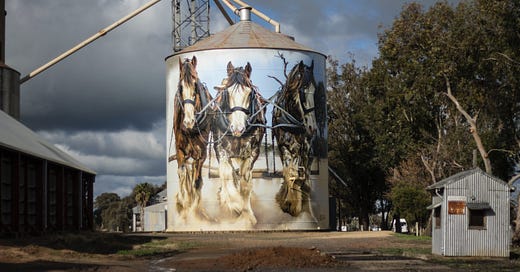I must have fallen off the John Deere somewhere between the 1950s and now and hit my head while plowing our cornfield. Before my little accident I remember sitting in a dimly lit tap room in a small Wisconsin town drinking a watery brew that was slightly reminiscent of beer, made by those wonderful folks at the Anheuser Busch Company (AB).
We Midwesterners were blessed with a couple generations of German immigrants that settled in our state. These fellows knew their hops and spent most of their adult lives huddled around mash tuns playing pinochle while the beer was doing what beer does best. Then, when the time was right, the brewmaster pronounced the suds "klar" (ready) and a few levers were pulled and off it went to the bottling room to be married up with a label before exiting the place by a fleet of semis, bound for thousands of dingy bars like mine throughout the Badger State.
Every farmer I knew had his own favorite beer. There was Carling Black Label, Blatz, Schlitz, Hamms and of course, Budweiser. Sod busters in feed caps and bib overalls swore they could tell the difference between the brews and drank like they were on a quest to prove it. That was when beer was a quarter and when men were men. Images of 'real men' were all around us, and the brewing companies were proud of their suds and of the fact that men were their prime customers. They treated us to advertising that extolled the virtues of masculinity and encouraged us to 'be all that we could be' (sorry U.S. Army but that was their intention).
There was one particular image that captured our imagination. It was of a huge beer wagon pulled by a team of bigger than big horses (18 hands high and weighing in at 2,600 lbs.) called 'Clydesdales' (the Clydesdale breed was founded in the early eighteenth century when two breeders, John Paterson of Lochlyoch and the 6th Duke of Hamilton, imported Flemish stallions and mated them with native draught mares in the Clyde valley of Scotland). In April of 1933, to celebrate the end of prohibition, August A. Busch, Jr. and Adolphus Busch III surprised their father, August A. Busch, Sr., with the gift of a six-horse Clydesdale hitch to commemorate the law's repeal. For generations, AB has proudly used those magnificent horses in advertising and on its labels to illustrate strength and resiliency.
Fast forward 90 years. Today, the company has hired Dylan Mulvaney - a man pretending to be a woman - to stud up and stand in for the Clydesdales in representing its Bud Light (BL) brand of beer. If you have not seen this little man cavorting about in gay abandon while popping the top on a can of BL, you've missed a rare opportunity to witness the first stages of the death of a famous brand. Not since Coca Cola nearly committed brand suicide back in April of 1985 with its 'experiment' to discontinue its world-renown Coke in favor of a new product that millions derisively called “New Coke” have we seen a company willingly bow to pressure to change a successful product into something nobody wanted.
Keep reading with a 7-day free trial
Subscribe to The American Landscape to keep reading this post and get 7 days of free access to the full post archives.


